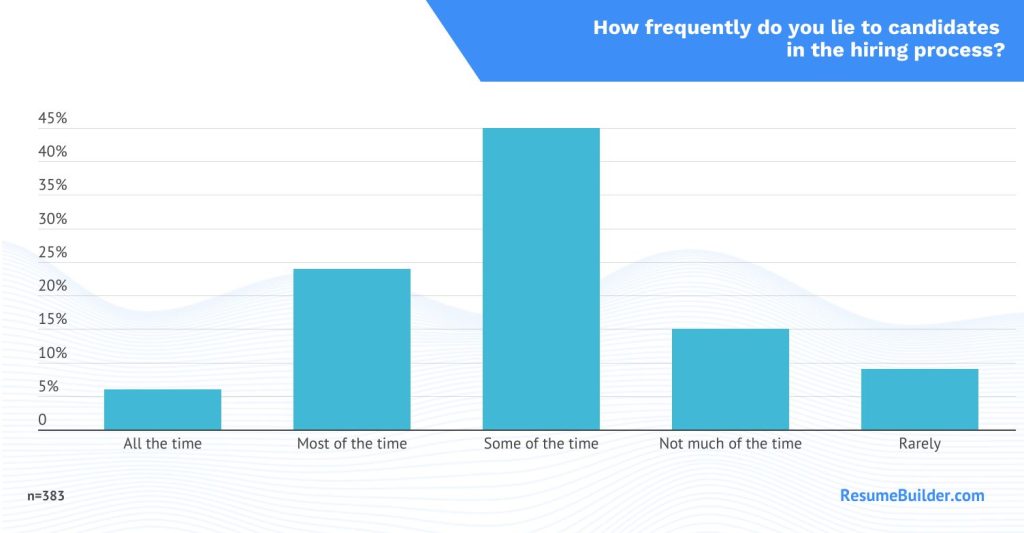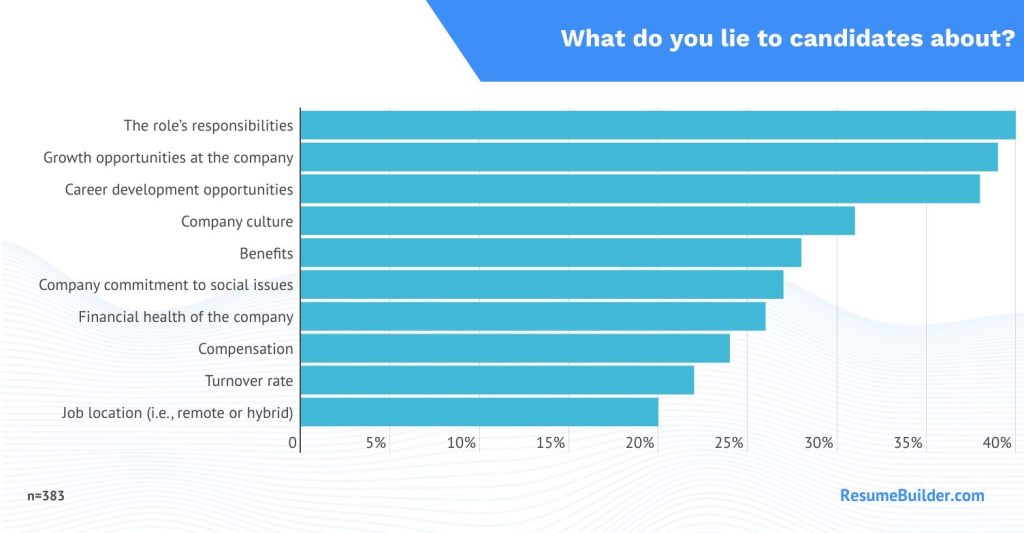This article details exactly how prevalent lying is during interviews (with statistics for both candidates and hiring managers), and why you should not consider lying in business the same as lying to your friends.
Those who claim lying is wrong… have an agenda
Ethics are a fluid topic, especially when they are defined by people who want you to tell the truth. If you run a search on YouTube for “Lying on a Resume” – every single video discusses the ethics around honesty and truthfulness. And executives preach the same thing. Politicians too!
What these people all have in common is that they get to their position by making people believe that integrity and honesty are important, while solely pursuing their own self-interest. As someone who has spent more than a decade in leadership positions, I can attest that executives have a very different definition of the morality around lying, compared to what they tell their teams.
Some other great quotes from two other ‘upstanding’ executives:
“We’ve always done our best to act with integrity and forthrightness in everything we’ve done.” – John Rigas, prior to being convicted of securities fraud
“I believe in what we’re doing at Enron. I think we’re on the side of the angels.” – Jeffrey Skilling at Enron, convicted of Securities Fraud and Making False Statements
In this article, we are going to discuss the discrepancy between what business leaders, recruiters, hiring managers, and society itself tells us about ethics, how they are actually conducting themselves, and helping you understand how this knowledge should be used to benefit your career and job search.
How to Lie on your ResumeIf you have concerns about an upcoming employment verification, and want to pass even after lying, we recommend reading our post about how to lie on your resume.
Telling the truth in interviews will always be punished, if everyone else is lying.

If you are concerned about a gap in your resume, and how it will affect an upcoming interview – learn about your options to conceal it.
The unfortunate truth is that statistically, if you are not lying during your interview, you are probably the only one.
Recently, a noted sociologist Robert S. Feldman of the University of Massachusetts studied how candidates handled the truth in interviews. In the study, he found that 81% of people lied about themselves during interviews (4 out of 5 candidates), with the more extroverted candidates being more apt to tell untruths. For those who are competing for technology roles, he found that deception increased in technical career categories, and overall, participants told an average of 2.19 lies per 15-minute interview.
If you are on this site and reading this blog, you are most likely uncomfortable lying. That is a good thing – it means you aren’t a sociopath! You likely have healthy relationships, are probably a great spouse, and overall live an ethical standard in your personal life.
But the standards for ethics are completely different between business and personal. How many times do companies sell a product that doesn’t work as advertised? How many times has your boss told you “The company is doing great – your job is safe” only to have layoffs a few months later? For those in sales, how often have you lied around the edges to get a deal closed?
You should not confuse ethics in life as having the same standard as ethics in business…
Hiring Managers Believe Lying in Business is Ethical

Indeed, not only do executives believe that lying is part of their job, but they actively engage in deceit during the recruitment and interview process. It’s not a sociopathic tendency, it’s the fact that experienced business people understand that self-interest is the currency of all organizations. We’ve provided several examples of this, including a recent news story of NFL executives who used self-interest to sabotage the interview process for another.
In August 2023, a large national study was run, including business leaders from various industries, about their tendencies to lie during the job process. The results were alarming – with 36% of hiring managers admitting that they consistently lied to their candidates during the recruitment process. Of those managers, 75% say they lied during the actual interview, 52% lied with a misleading job description, and 24% lied in the offer letter.

But it’s not just these managers that are a problem. Of all managers surveyed, 80% said that lying is ‘very acceptable’ or ‘somewhat acceptable’. They understand that the point of the interview (from both the employer’s side and the candidate’s side) is to tell a story, and each party furthering their own self-interest.

If executives believe that lying in business is acceptable, why do candidates still believe in ethics?

How to Get over your Fear of Lying
If you are needed to adjust something on your resume, we recommend our Background Verification service.
The best way to get over your fear of lying, and to start using it during interviews, is to understand that lying does not make you an immoral person. Those who say that you should be ethical in interviews, are telling you this because it’s in their own best interest for you to tell them the truth. Either they are a recruiter, a hiring manager (it’s in their best interest for all candidates to tell the truth), or they are candidates who lie and want to win interviews against other candidates who tell the truth.
As someone with years of experience in senior executive roles, I promise you that the people at the senior most levels got there, because they understand when and how to lie. This doesn’t mean becoming a sociopathic liar, but understanding the few times it’s appropriate to bend the truth in order to tell a compelling story. A story about your experience, for instance, is the single-best asset you can have to get hired and promoted.
It’s time for you to stop treating business relationships the same as personal relationships, and do what is best for your career.
